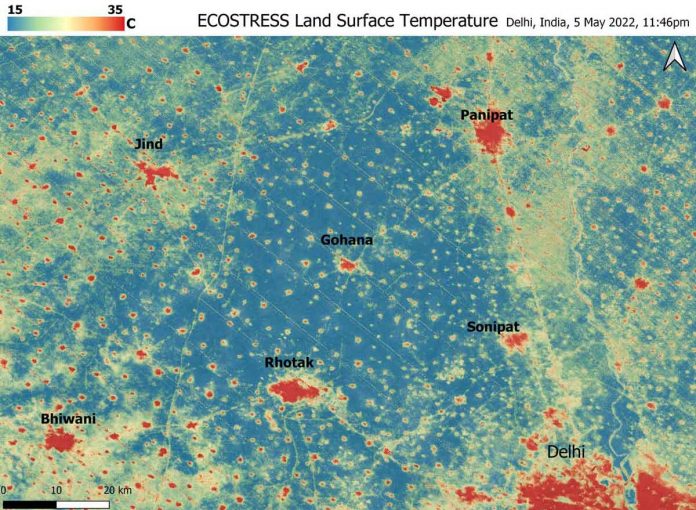A relentless heat wave has blanketed India and Pakistan since mid-March. It caused dozens of deaths, fires, increased air pollution and reduced crop yields. Weather forecasts show no prospect of relief any time soon. NASA’s Ecosystem Spaceborne Thermal Radiometer Experiment on Space Station instrument (ECOSTRESS) has been measuring these temperatures from space.
This image is taken shortly before local midnight on May 5. It shows urban areas and agricultural lands northwest of Delhi (the large red area in the lower right) that are home to about 28 million people. The image covers about 4,800 square miles.
Cities are usually markedly warmer than the surrounding countryside due to human activities and the materials used in the built environment. The image clearly delineates these urban “heat islands.” Nighttime temperatures in Delhi and several smaller villages were above 95 degrees Fahrenheit (35 degrees Celsius). The temperature peaked at about 102 degrees F (39 degrees C) and the rural fields nearby had cooled to around 60 degrees F (15 degrees C). This data suggests that city dwellers are experiencing considerably higher temperatures than the average temperatures reported for their regions.
ECOSTRESS measures the temperature of the ground itself, which is very similar to air temperature at night. The instrument launched to the space station in 2018. Its primary mission is to identify plants’ thresholds for water use and water stress. It gives insight into their ability to adapt to a warming climate. ECOSTRESS also records other heat-related phenomena. With a pixel size of about 225 feet (70 meters) by 125 feet (38 meters), its high-resolution images serve as a powerful tool for understanding aspects of the weather event that might be overlooked by traditional observation networks.

